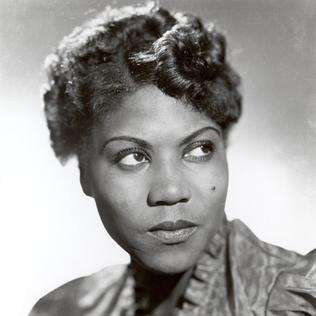Guitarist, pianist, arranger, singer, and lyricist Sister Rosetta Tharpe was born Rosetta Nubin on March 20, 1915, in Cotton Plant, Arkansas to Pentecostal Pastor Willis B. Atkins from Arkadelphia and Katie Bell Harper Nubin, a musician and pastor from Princeton, Arkansas.
At three Tharpe’s mother began teaching her to sing and play the guitar. By six she was accompanied on the mandolin by her mother as they evangelized as part of the Rev. F.W. McGee’s itinerant revival group.
After examining numerous resources, evidence indicated that Tharpe had not acquired formal academic preparation. However, her specific education was based on church music from the Church of God in Christ.
In 1931, the family moved to Harlem, New York, and in 1934, her mother arranged for Tharpe to marry Thomas Julian Thorpe, a pastor. She did but left him in 1938 while keeping his name but changing the spelling to Tharpe. By 1938, Tharpe, was performing gospel music at the Cotton Club and Café Society with Bill “Bojangles” Robinson, Cab Calloway, and Benny Goodman. Also, that year she signed her first contract with Decca Records. Her gospel hits with Decca included “The Lonesome Road” and “Rock Me.” In 1941, Tharpe became a member of Lucky Millinder Band and performed at Harlem’s legendary Savoy Ballroom. In 1944, Tharpe and Decca’s boogie-woogie pianist Sammy Price, recorded “Strange Things Happening Every Day” which was the first gospel song to score Top Ten on Billboard’s Harlem Hit Parade.
Tharpe and Russell Morrison, her road manager, married on July 3, 1951, in Griffith Baseball Stadium in Washington, DC, followed by a grand concert with her former duet partner, singer-pianist Madame Marie Knight who was the wedding’s maid of honor and her backup singers, her bridesmaids. This promotion (wedding followed by a concert) proved a success as 25,000 fans paid from 90 cents to $2.50 a ticket. After the wedding celebrations, Decca Records released the album The Wedding Ceremony of Sister Rosetta Tharpe and Russell Morrison, with the ceremony on one side and concert selections on the other.
During the 1950s, Tharpe became the first gospel performer to tour Europe, breaking the color barrier. While in England in 1957, she gave an impromptu performance at the London Airport to promote her gospel record sales. By 1960, Tharpe was back in the United States performing at the Apollo Theatre in Harlem. In 1967, she toured and performed at the Newport Folk Festival in Newport, Rhode Island. Three years later, in 1970, complications from diabetes resulted in Tharp’s leg amputation.
In 1972, Tharpe performed her last major concert at New York’s Lincoln Center’s Soul at the Center Festival. She sang two of her most popular tunes, “Precious Lord” and “Just a Closer Walk with Thee.”
Sister Rosetta Tharpe, the first musician to popularize Black gospel music and who over her career, recorded 17 albums, died on October 9, 1973, in Temple University Hospital in Philadelphia, Pennsylvania after a massive stroke and coma. She was 58.
After Tharpe’s death, she was posthumously inducted into the Blues Hall of Fame in Memphis, Tennessee in 2007 and 2018, into the Rock and Roll Hall of Fame in Cleveland, Ohio.

